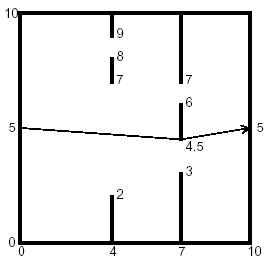The Doors
| Time Limit: 1000MS | Memory Limit: 10000K | |
| Total Submissions: 7641 | Accepted: 2987 |
Description
You are to find the length of the shortest path through a chamber containing obstructing walls. The chamber will always have sides at x = 0, x = 10, y = 0, and y = 10. The initial and final points of the path are always (0, 5) and (10, 5). There will also be from 0 to 18 vertical walls inside the chamber, each with two doorways. The figure below illustrates such a chamber and also shows the path of minimal length.


Input
The input data for the illustrated chamber would appear as follows.
2
4 2 7 8 9
7 3 4.5 6 7
The first line contains the number of interior walls. Then there is a line for each such wall, containing five real numbers. The first number is the x coordinate of the wall (0 < x < 10), and the remaining four are the y coordinates of the ends of the doorways in that wall. The x coordinates of the walls are in increasing order, and within each line the y coordinates are in increasing order. The input file will contain at least one such set of data. The end of the data comes when the number of walls is -1.
2
4 2 7 8 9
7 3 4.5 6 7
The first line contains the number of interior walls. Then there is a line for each such wall, containing five real numbers. The first number is the x coordinate of the wall (0 < x < 10), and the remaining four are the y coordinates of the ends of the doorways in that wall. The x coordinates of the walls are in increasing order, and within each line the y coordinates are in increasing order. The input file will contain at least one such set of data. The end of the data comes when the number of walls is -1.
Output
The
output should contain one line of output for each chamber. The line
should contain the minimal path length rounded to two decimal places
past the decimal point, and always showing the two decimal places past
the decimal point. The line should contain no blanks.
Sample Input
1 5 4 6 7 8 2 4 2 7 8 9 7 3 4.5 6 7 -1
Sample Output
10.00 10.06
不错的一个题.
题意:求(0,5)和(10,5)两个点之间的最短距离
先把每个点和每条线段记录下来,然后每两个点之间如果能够直连就根据下标记录下来距离(这里要判断两个点连成的线段是否与其之间的所有线段有交点,有交点就不能直连,我用了两个变量对自身线段做了特判)然后用最短路算法进行求解。三层循环0MS,这题数据也是水。
#include <iostream> #include <cstdio> #include <string.h> #include <math.h> #include <algorithm> using namespace std; struct Point{ double x,y; }p[400]; struct Line{ Point a,b; }line[400]; int n; const double INF = 9999999; double mp[400][400]; double low[400]; bool vis[400]; double dijstra(int n){ memset(vis,false,sizeof(vis)); memset(low,0,sizeof(low)); int pos = 0; vis[pos]=true; for(int i=0;i<=n;i++){ low[i] = mp[pos][i]; } for(int i=0;i<n-1;i++){ int mi = INF; for(int j=0;j<=n;j++){ if(!vis[j]&&mi>low[j]){ pos = j; mi = low[j]; } } vis[pos] = true; for(int j=0;j<=n;j++){ if(!vis[j]&&mp[pos][j]+low[pos]<low[j]){ low[j] = mp[pos][j]+low[pos]; } } } return low[n]; } double dis(Point a,Point b){ return sqrt((a.x-b.x)*(a.x-b.x)+(a.y-b.y)*(a.y-b.y)); } ///叉积 double mult(Point a, Point b, Point c) { return (a.x-c.x)*(b.y-c.y)-(b.x-c.x)*(a.y-c.y); } ///a, b为一条线段两端点c, d为另一条线段的两端点 相交返回true, 不相交返回false bool isCross(Point a, Point b, Point c, Point d) { if (max(a.x,b.x)<min(c.x,d.x))return false; if (max(a.y,b.y)<min(c.y,d.y))return false; if (max(c.x,d.x)<min(a.x,b.x))return false; if (max(c.y,d.y)<min(a.y,b.y))return false; if (mult(c, b, a)*mult(b, d, a)<0)return false; if (mult(a, d, c)*mult(d, b, c)<0)return false; return true; } void addline(double x,double y1,double y2,int &k){ line[k].a.x = line[k].b.x =x; line[k].a.y = y1; line[k].b.y = y2; k++; } int main() { while(scanf("%d",&n)!=EOF&&n!=-1){ int k = 0,m=1; ///k代表线段的条数,m代表点的个数 p[0].x = 0,p[0].y = 5; ///起点 for(int i=0;i<n;i++){ double x,y1,y2,y3,y4; scanf("%lf%lf%lf%lf%lf",&x,&y1,&y2,&y3,&y4); p[m].x =x,p[m++].y = y1; p[m].x =x,p[m++].y = y2; p[m].x =x,p[m++].y = y3; p[m].x =x,p[m++].y = y4; addline(x,0,y1,k); addline(x,y2,y3,k); addline(x,y4,10,k); } p[m].x = 10,p[m].y = 5; ///终点 for(int i=0;i<=m;i++){ for(int j=0;j<=m;j++) mp[i][j]=INF; } for(int i=0;i<=m;i++){ for(int j=i+1;j<=m;j++){ Line l; l.a.x = p[i].x,l.a.y = p[i].y; l.b.x = p[j].x,l.b.y = p[j].y; if(l.a.x==l.b.x) continue; int temp,temp1; for(int t=0;t<k;t++){ ///特判 if(line[t].a.x==p[j].x&&line[t].a.y==p[j].y) { temp = t;break; } if(line[t].b.x==p[j].x&&line[t].b.y==p[j].y) { temp = t;break; } } for(int t=0;t<k;t++){ if(line[t].a.x==p[i].x&&line[t].a.y==p[i].y) { temp1 = t;break; } if(line[t].b.x==p[i].x&&line[t].b.y==p[i].y) { temp1 = t;break; } } bool flag = true; for(int t=0;t<k;t++){ if(t==temp||t==temp1) continue; if(isCross(l.a,l.b,line[t].a,line[t].b)){ flag = false; break; } } if(flag){ mp[i][j] = mp[j][i] = dis(p[i],p[j]); } } } double ans = dijstra(m); printf("%.2lf ",ans); } return 0; }